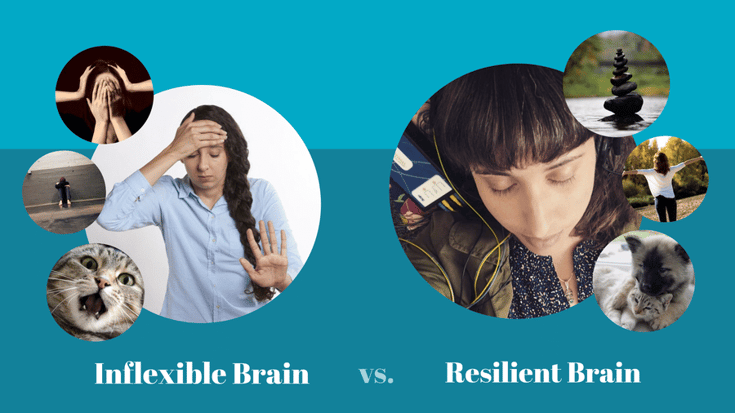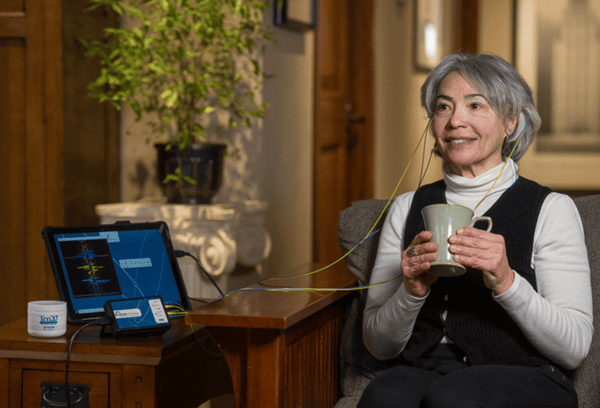Remote Neurofeedback vs. NeurOptimal® Home Training: Understanding the Key Differences
Discover the differences between Remote Neurofeedback and NeurOptimal® Home Training. Learn how each approach works, their benefits, and which option...
What are some good ways to destress? Discover tips to improve relaxation and understand why it's sometimes hard to choose to shift out of stress and business.
For those of us who grew up in homes that weren't safe or didn't feel safe, which for the brain is the same thing, the idea of living in a state of calm is almost impossible to imagine. Why is it so hard to feel relaxation at the end of the day? We'll answer this question, explore three evening activities we think will make us calm, but actually don't, and list the most common fears that pop up when we start to relax.
The brain is stuck in the stress response; it is registering "danger" when there is none. When this patterning started in childhood it is called "complex trauma" because the child's emotional, cognitive and social development --feelings, beliefs about him/herself and abilities in the world --are merged with the brain's developing a dominant pattern of reacting to the environment with a stress response.
The stress response --or fight/flight/freeze response -- is the primitive brain's problem solving strategy to ensure survival when threatened. This patterning is reflected in our neural pathways, the expression "neurons that fire together, wire together." An example of how that wiring gets formed: a child who is repeatedly home alone at too young an age (too young being defined by the inability to know how to run a home: how to cook, use a phone, problem-solve home related issues) and, therefore, the brain starts to rouse a stress response as it's strategy for safety and problem solving. It stays "on-alert" not being confident about what the possible threats are, and how to master this environment. The brain is learning "home" and "not safe", therefore, go into a stress response and wires those pathways together. (For more study, Dr. Bessal Van Der Kolk in his book The Body Keeps the Score does an excellent job of explaining this dynamic and how it gets reflected in self-esteem, personal beliefs and coping strategies.)
Related: Watch Bessel Van Der Kolk on YouTube on How to Work with the Traumatized Brain
Fast forward twenty years and that kid, now an adult, comes home from a long day at work and his/her brain, instead of shifting into "rest mode/relaxation" reves up or stays in "go-mode" or hyperarousal, which feels like anxiety, racing thoughts's, upset stomach, or bodily discomfort. We would like to relax but because the part of our brain in charge of the thought, "I'm home after a long day of work and now let's relax" (the pre-frontal cortex) is, unfortunately, not in charge of the part of the brain, (our limbic brain) that decides whether to stay in a stress response.
Here are three things we think will help us relax but actually don't.
While alcohol is a depressant, and wil bring us down out of an anxious, "fight/flight" response. It works on the brain neurotrasmitters that decrease energy levels. It doesn't actually put is in relaxation, rather it sends us into a "freeze" response. The depressive/freeze response is still part of the stress response, it's only the other end of the spectrum. "Instead of fighting or running I'll play dead to get away from the danger." Read more on what alcohol does to the brain.
"I'll just sit and relax in front of my favorite show." TV's, computer monitors and mobile phones emit blue light, which stimulates the brain. Blue light, which is morning light, communicates "wake up" to the brain, at the time when it is supposed to be producing melatonin, the sleep-inducing neurotransmitter. We also tend to watch shows that are arousing, and stimulate excitation and fear.
 Our 'reward' at the end of the day, while it does stimulate the reward/pleasure center in the brain and makes us feel good, it also give us energy. It causes a spike in our blood-sugar levels, which makes the body release insulin to get rid of all the sugar, which can lead to too much insulin and then there's a drop in blood sugar, which signals to the adrenals that the body is 'threatened' and it releases the stress hormone cortisol. All this while you're trying to sleep! No surprise that the body will come into full wakefulness in between sleep cycles (the 2 AM wake-up) and be challenged to fall back to sleep.
Our 'reward' at the end of the day, while it does stimulate the reward/pleasure center in the brain and makes us feel good, it also give us energy. It causes a spike in our blood-sugar levels, which makes the body release insulin to get rid of all the sugar, which can lead to too much insulin and then there's a drop in blood sugar, which signals to the adrenals that the body is 'threatened' and it releases the stress hormone cortisol. All this while you're trying to sleep! No surprise that the body will come into full wakefulness in between sleep cycles (the 2 AM wake-up) and be challenged to fall back to sleep.
The good news is that it IS possible to train the body to come out of the stress response. In the same way we can train our bodies through physical exercise we can rewire our brains through new brain-changing practices. As we age the brain becomes inflexible in that it relies too heavily on habitual reactivity and not enough on collecting real-time data to inform emotional decisions. What we experience is a pattern of negative moods that don't shift with our shifting experience.

Let's start with the most effective way to destress in 30 minutes. Exercise. The research has proven, hands down, cardiovascular exercise, and even walks in nature, bring the brain out of the state of anxiety, the fight/flight reaction and also the depressive or hopeless reaction, also know as the freeze response. Not only does it have an immediate response, it also significantly contributes to improved sleep, particularly for middle-aged and elderly adults.
There are foods that heighten our stress response and foods that help us switch to relaxation. Foods that help us switch to brain regulation and relaxation:

We spend a lot of time and money training our children to know how to put themselves to bed so that they are ready to fall asleep within 15 minutes of getting into bed. As adults, don't realize that our poor quality of sleep is most often created by not having a nighttime ritual designed for the preparation for quality sleep. The recommended treatment for insomnia is cognitive behavioral therapy. Put another way: the treatment is learning how to put yourself to bed so that your brain is in rest mode and knowing how to manage stress-inducing thoughts at night./eat-and-sleep-well-neurofeedback-training-co.png?width=560&name=eat-and-sleep-well-neurofeedback-training-co.png)
The key being ready for sleep is:
Read More on improving sleep and download our e-book on sleep hygiene
The bad news is that we're not always comfortable when we do start to relax and will try to unconsciously find reasons to re-arouse the brain into a stress response. We watch stimulating TV programs, or check our work emails just before bed. We have to understand and switch our preference from being stimulated and emotionally engaged to being calm and even bored just before bed.
Becoming familiar with relaxation is a process. We don't switch from being stressed out all the time to being calm in one day or even one month. The first step is understanding why relaxation is so important. The second step is being able to register what it feels like in the body to be relaxed.
Here is a common conversation I have with clients who are beginning to experiencing the relaxation response from a neurofeedback session. Neurofeedback is a EEG brain training technology that brings the brain out of the stress response. (Watch a video that explains how, "What is Neurofeedback".)

Natalie: You’re calming down. That weighty, rested state you are experiencing in your body at the end of the session is relaxation.
You are used to living from a stress response where your nervous system (brain) is acting from a fight/flight/freeze response. It’s actually the most primitive part of your brain that is in charge—your reptilian brain—and it motivates you to misperceive the environment as one where there is ALWAYS danger present.
Nothing, if it is engaged for short periods of time, (like the amount of time it takes you to get awayfrom a falling brick) but then your body is supposed to go back into a state of relaxation. The flight/fight response is ONLY to be used in short bursts. Like a runner sprinting—a good technique for a short distance—but she’ll never make it to the finish line of a marathon. In the same way, the fight/flight response is only meant for short periods; then we are meant to go back into a state of calm/aware. When we’re in a state of calm alert (not hypervigilent alert) we have access to our entire brain’s resources—and for us creative people this is important. Our spontaneity, sense of openness, sense of will and purpose are not engaged when we are triggered by fight/flight.
Yes, that’s why, for example, in the creative offices at Google they have ping pong tables. We are coming to understand that in a state of relaxation is the best place to come up with original ideas.
Because you are habituated. Your brain, in trying to be efficient—doing the same response over and over again—does not realize that it is NOT being effective. Now is not then. At some point in the past you were in a state of danger, but then your brain became habituated and just responses the same way as in the past.
The first step is understanding that it is not the appropriate or most effective strategy for overcoming life's challenges and meeting our goals. Then we have to look at ourselves holistically and assess what are the activities and attitudes that will help to come out of the stress response and into a state of brain regulation and which are the ones that perpetuate the habit. Then we come up with a realistic and doable strategy for creating the supports.
When the brain is in regulation it is open and calm. And when we are in this state we—our conscious will—are in charge, and not the limbic--reptile brain!
Working with lowering our stress by changing our lifestyle takes time. Give yourself three months of incrementally adding new habits. Don't assess the improvements until two months, then reflect on what's having an impact and what isn't.
The most important change is our attitude: We can rewire our brains to be calmer and happier. It just takes some effort and time.
Natalie Baker has over 25 years of experience as a licensed psychotherapist and has been a NeurOptimal® neurofeedback trainer since 2011. She is the founder of Neurofeedback Training Co., which offers in-person sessions and runs the largest nationwide home rental program for NeurOptimal systems. Natalie also teaches meditation and Buddhist psychology and specializes in working with anxiety, stress, ADHD, and trauma.
Discover the differences between Remote Neurofeedback and NeurOptimal® Home Training. Learn how each approach works, their benefits, and which option...
Read this Neuroptimal neurofeedback review to learn how it helped train the author's brain and others. Start optimizing your brain today!
Four Effective Ways to Reduce Stress without Leaving Home. Discover tips from Neurofeedback Training Co to reduce stress from home.
Be the first to know about new blogs